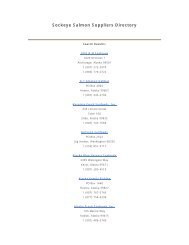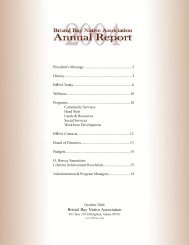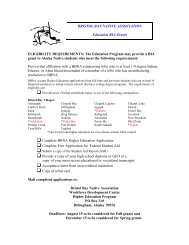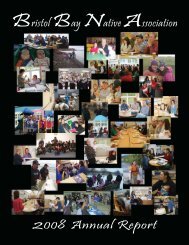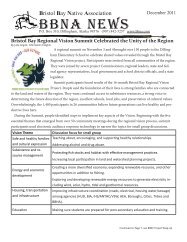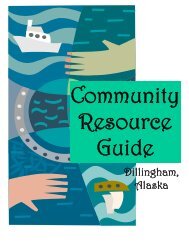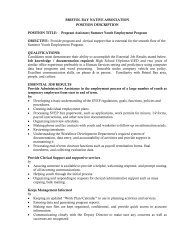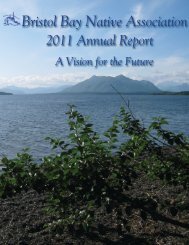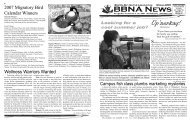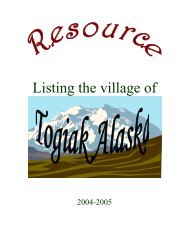2012 Annual Report - Bristol Bay Native Association
2012 Annual Report - Bristol Bay Native Association
2012 Annual Report - Bristol Bay Native Association
You also want an ePaper? Increase the reach of your titles
YUMPU automatically turns print PDFs into web optimized ePapers that Google loves.
Tribal Energy<br />
Melody Nibeck is the Program Manager for the Tribal Energy Program. She is finalizing the <strong>Bristol</strong><br />
<strong>Bay</strong> Energy Efficiency & Conservation Block Grant Program where 14 communities around the region<br />
participated in energy audits and upgrades to community buildings<br />
and homes. A final report will be delivered this fall. Many of the<br />
upgrades performed included improvements to indoor and outdoor<br />
lighting, replacing and installing windows and doors, and blowfilling<br />
insulation into attics. The end-results promise to help Tribes<br />
save energy and money.<br />
Melody is working in partnership with the Environmental and<br />
Forestry programs at BBNA, and the Aleknagik Tribal Council on<br />
the <strong>Bristol</strong> <strong>Bay</strong> Clean Air Project. The project is collecting data on<br />
home heating systems and wood harvest practices. The results will<br />
be analyzed for efficiency and sustainability standards, and to help<br />
develop a potential wood stove change-out program.<br />
Melody is working<br />
in partnership with<br />
the Alaska Energy<br />
Authority (AEA) and<br />
Southwest Alaska<br />
Municipal Conference<br />
(SWAMC) for<br />
Phase One of the<br />
<strong>Bristol</strong> <strong>Bay</strong> Strategic<br />
Alternative Energy<br />
Options Analysis.<br />
The energy authority<br />
is engaging regions<br />
around the state to<br />
start preparing for<br />
a regional approach<br />
to energy programs<br />
and projects. According<br />
to AEA, “Regional<br />
Energy Planning is<br />
a way for Alaskans<br />
to determine their<br />
energy priorities and<br />
formulate a concrete, implementable, and fundable energy plan. The plans should address energy<br />
needed for electricity, heating and transportation. Each energy region can craft a specific action plan<br />
to ensure a less expensive, more reliable, efficient and sustainable energy future. Each planning effort<br />
will include regional stakeholders, evaluate alternatives and provide a prioritized action plan of<br />
projects that can be funded.” Phase One is scheduled to begin soon, and will employ a technical team<br />
of engineers and economists.<br />
Melody is also working on the development of a Regional Bulk Fuel Purchasing Program. The<br />
project is surveying bulk fuel buyers in each community and testing a level of interest in participating<br />
in a program. It is generally believed that purchasing fuel in large volumes and providing for a single<br />
administrative point of contact can result in lower prices. In April, Melody was invited to testify at a<br />
congressional hearing in Fairbanks on the “Federal Laws and Policies Affecting Prices in Rural Alaska<br />
and their Effects on <strong>Native</strong> Villages.” She also continues to participate in the Energy Efficiency Partnership<br />
meetings, organize events for Alaska Energy Awareness Month each October, regularly update<br />
Tribes on upcoming energy opportunities, events and news, and advocate for alternative energy<br />
programs.<br />
Melody can be contacted at (907) 842-6224 or mnibeck@bbna.com.<br />
13



